Big Box Store Alternatives: Supporting Small Businesses
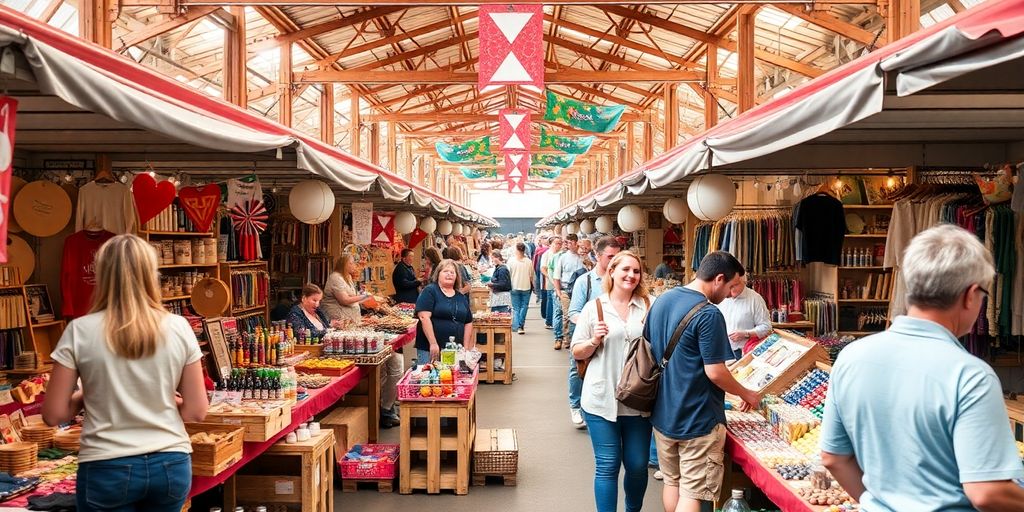
More and more people are stepping away from big box stores and looking for better ways to shop. While those large retailers can be convenient, they often hurt our communities and the environment. In this article, we’ll explore some great alternatives to big box stores that not only help local economies but also provide unique shopping experiences. Let’s dive into the world of small businesses and see how supporting them can make a big difference!
Key Takeaways
- Shopping small boosts local economies and creates jobs.
- You get personalized service and a unique shopping experience.
- Farmer’s markets offer fresh, local produce and handmade goods.
- Thrift and consignment shops are eco-friendly and budget-friendly.
- Community co-ops support local artisans and sustainable practices.
Understanding the Impact of Big Box Stores
It’s easy to get caught up in the convenience of big box stores. They’re everywhere, and they seem to have everything. But have you ever stopped to think about the real impact these giants have on our communities and the world around us? It’s more than just low prices and one-stop shopping.
Environmental Consequences
Big box stores often rely on extensive supply chains that stretch across the globe. This leads to significant greenhouse gas emissions from transportation. Think about all the trucks, ships, and planes needed to get those products to your local store. Plus, the sheer volume of goods they sell contributes to a massive amount of waste, from packaging to unsold items that end up in landfills. It’s a cycle of consumption that puts a strain on our planet’s resources. Here’s a quick look at some of the environmental impacts:
- Increased carbon footprint due to transportation.
- Excessive packaging waste.
- Depletion of natural resources for mass production.
Economic Disparities
While big box stores might offer lower prices, they can also drive local businesses out of business. They have the buying power to negotiate deals that smaller shops simply can’t match. This can lead to a decline in local economies, as money flows out of the community and into the pockets of corporate shareholders. It’s a tough reality for many small business owners trying to compete. Consider these points:
- Reduced revenue for local businesses.
- Job losses in the small business sector.
- Decreased economic diversity in the community.
Community Disconnection
Big box stores can sometimes feel impersonal. You’re just another customer in a sea of shoppers. They don’t exactly foster a sense of community. Local businesses, on the other hand, often create a gathering place where people connect, share stories, and build relationships. It’s about more than just buying something; it’s about being part of something bigger. If you are looking for WooCommerce alternatives, consider the impact on your community.
Shopping at big box stores can be convenient, but it’s important to consider the broader consequences. By supporting local businesses, we can create a more sustainable, equitable, and connected community for everyone.
Benefits of Supporting Local Businesses

Economic Growth
When you choose to spend your money at a local business, you’re doing more than just buying a product or service; you’re investing directly in your community. These businesses often use local suppliers, keeping money circulating within the area. This creates jobs and helps to strengthen the local economy. It’s a ripple effect that benefits everyone. Think of it as planting a seed that grows into a tree that provides for the whole neighborhood. Supporting local businesses is a great way to make money online.
Personalized Customer Service
Forget the impersonal interactions you might have at big box stores. Local businesses thrive on building relationships with their customers. You’re not just a number; you’re a neighbor. They often go the extra mile to provide exceptional service, offering tailored advice and solutions. They care about your experience and want you to come back. This personal touch makes all the difference.
Unique Product Offerings
Tired of seeing the same things everywhere you go? Local businesses often offer unique, handcrafted, or locally sourced products that you won’t find in chain stores. This adds character and charm to your community, making it a more interesting place to live. You’ll discover hidden gems and support local artisans and creators. It’s a win-win!
Supporting small businesses helps preserve the unique character of a local business, maintaining the charm and individuality that large chains often lack. It allows for a more vibrant, diverse, and resilient economy, where unique talents and products can flourish.
Exploring Farmer’s Markets
Farmer’s markets are a great alternative to big box grocery stores. You can find fresh, local produce and support your community at the same time. It’s a win-win!
Fresh Produce and Local Goods
Farmer’s markets are known for their amazing selection of fresh fruits and vegetables. But they often have so much more! You can find local honey, homemade jams, baked goods, and even handcrafted items like soaps and candles. It’s a great way to discover unique products you won’t find anywhere else.
Supporting Local Farmers
When you shop at a farmer’s market, you’re directly supporting local farmers and their families. This helps keep money in your community and ensures that farmers can continue to grow high-quality food. It’s a much more direct way to support agriculture than buying from a big chain.
Community Engagement
Farmer’s markets are more than just a place to buy groceries; they’re a community hub. You can meet the farmers who grow your food, chat with your neighbors, and enjoy a lively atmosphere. Many markets also host events like live music and cooking demonstrations, making it a fun outing for the whole family.
I love going to the farmer’s market on Saturday mornings. It’s a great way to start the weekend, and I always find something new and interesting. Plus, it feels good to support the people who are working hard to bring us fresh, local food.
The Value of Thrift and Consignment Shops
Thrift and consignment shops present a fantastic alternative to big box stores, offering a unique blend of sustainability, affordability, and the thrill of the hunt. It’s not just about saving money; it’s about embracing a different way of consuming.
Sustainable Shopping Practices
Thrift stores are a champion of sustainability. By purchasing pre-owned items, you’re directly reducing textile waste and lessening the demand for new production, which conserves resources and minimizes environmental impact. It’s a simple yet powerful way to contribute to a more circular economy. Plus, you might find something truly special that no one else has!
Unique Finds and Vintage Treasures
One of the most exciting aspects of thrifting is the potential to uncover unique, one-of-a-kind items. You never know what hidden gems you might find – a vintage dress, a retro piece of furniture, or a quirky accessory that perfectly expresses your personal style. These shops are treasure troves for those seeking special items with character and history, offering a refreshing departure from the mass-produced goods found in typical retail environments.
Budget-Friendly Options
For those looking to save money, thrift and consignment shops are an excellent choice. You can find high-quality clothing, furniture, and household goods at significantly lower prices than you would pay for new items. This makes it possible to update your wardrobe or furnish your home without breaking the bank. It’s a smart way to stretch your budget and still enjoy stylish and functional items.
Shopping at thrift stores isn’t just about finding a good deal; it’s about making a conscious choice to support a more sustainable and community-focused way of life. It’s about valuing the history and stories behind the items we own and reducing our impact on the planet.
Community Co-ops as Shopping Alternatives

Community co-ops are a cool alternative to big box stores, especially if you’re trying to be more mindful about where your money goes. These are basically member-owned businesses, which means the people who shop there also own a piece of the place. It’s a different vibe than just being a customer.
Member-Owned Benefits
One of the biggest perks of a co-op is that you’re not just a customer; you’re a member. This often comes with benefits like discounts, voting rights on important decisions, and a sense of ownership. The profits usually go back into the co-op or are distributed among the members, instead of lining the pockets of some distant CEO. It’s a more democratic way to shop, and you feel like you have a real stake in the business. Plus, you get to meet other people who care about the same things you do.
Focus on Sustainability
Co-ops often prioritize sustainability in a big way. They tend to stock eco-friendly products, source locally, and minimize waste. You’ll find a lot of organic produce, ethically made goods, and items with minimal packaging. It’s a good way to reduce your environmental impact while still getting what you need. They often have educational programs too, so you can learn more about sustainable living.
Local Artisan Support
Many community co-ops make a point of supporting local artisans and producers. This means you can find unique, handcrafted items that you wouldn’t see in a big box store. Think handmade soaps, locally roasted coffee, and art from neighborhood artists. It’s a great way to support the local economy and get something special. Plus, you often get to meet the people who made the products, which adds a personal touch. It’s a win-win for everyone involved.
Community co-ops are more than just stores; they’re about building community and supporting values. They offer a way to shop that aligns with your principles, whether it’s sustainability, local economies, or ethical production. It’s a different way of thinking about consumerism, one that puts people and planet first.
Holiday Shopping Strategies for Small Businesses
The holiday season is a crucial time for small businesses. It’s when they can really shine and connect with their community. But to make the most of it, a little planning goes a long way. Let’s explore some strategies to make your holiday shopping impactful and support those local gems.
Planning Ahead
Don’t wait until the last minute! Early bird shopping is key when it comes to small businesses. They often have unique, limited-stock items, so getting a head start ensures you snag the perfect gifts before they’re gone. Plus, it helps you avoid the holiday rush and enjoy a more relaxed shopping experience. Sign up for email lists early to make sure you hear about seasonal offers and limited-time inventory drops. Many online retailers offer special discounts on “Small Business Saturday” which is the Saturday after Thanksgiving.
Visiting Local Markets
Local markets are a treasure trove of unique and handcrafted gifts. Visiting craft fairs and farmers’ markets not only provides you with one-of-a-kind presents but also immerses you in the festive spirit. You’ll find alternatives to Moz and artisanal goods that add a personal touch to your presents. It’s a great way to support local artisans and discover hidden talents within your community.
Gift Card Options
Gift cards from small businesses make thoughtful presents. They offer recipients the joy of discovering something special on their own. It’s also a fantastic way to support the business financially, providing them with much-needed revenue during the holiday season. Consider purchasing gift cards from your favorite local restaurants, boutiques, or service providers.
Shopping small during the holidays isn’t just about buying gifts; it’s about investing in your community. It’s about supporting the dreams of local entrepreneurs and fostering a vibrant, diverse economy. By making conscious choices, you can turn your holiday shopping into a celebration of community, sustainability, and heartfelt giving.
Making a Shift Towards Conscious Consumerism
Understanding Your Impact
It’s easy to get caught up in the convenience of big box stores, but taking a step back to think about where your money goes can make a big difference. Conscious consumerism is about being aware of the social, economic, and environmental consequences of your purchasing choices. It’s not about being perfect, but about making more informed decisions.
Building Community Connections
Shopping small isn’t just about buying stuff; it’s about building relationships. When you shop at local businesses, you’re more likely to interact with the owners and employees, creating a sense of community. These connections can lead to a stronger, more vibrant local area. It’s about knowing where your products come from and who benefits from your purchases. This direct connection fosters trust and a sense of belonging that’s often missing in larger retail environments.
Encouraging Sustainable Practices
Choosing small businesses often means supporting more sustainable practices. Many local shops prioritize eco-friendly products, reduce waste, and source materials responsibly. By supporting these businesses, you’re voting with your wallet for a more sustainable future. It’s a way to reduce your environmental footprint and encourage other businesses to adopt similar practices.
Making a shift towards conscious consumerism is a journey, not a destination. It’s about making small changes over time that add up to a big impact. It’s about being mindful of your choices and supporting businesses that align with your values. It’s about creating a more sustainable and equitable world, one purchase at a time.
Here are some ways to encourage sustainable practices:
- Buy less stuff overall.
- Choose products with minimal packaging.
- Support businesses that prioritize fair labor practices.
Wrapping It Up: The Power of Shopping Small
In the end, choosing to shop small really matters. It’s not just about buying stuff; it’s about making a difference in your community. Every time you spend your money at a local shop or market, you’re helping to create jobs and keep unique businesses alive. Plus, you get to enjoy products that are often made with care and creativity. So, next time you think about hitting up a big box store, consider checking out a local shop instead. You might find something special and help your neighborhood thrive at the same time. Let’s keep our communities vibrant and support those small businesses that make our towns unique!
Frequently Asked Questions
Why should I avoid big box stores?
Big box stores can be convenient, but they often hurt local economies and the environment. They produce a lot of waste and can disconnect communities.
How do small businesses help the economy?
When you shop at small businesses, your money stays in the community. This creates jobs and helps local families.
What can I find at farmer’s markets?
Farmer’s markets offer fresh fruits, vegetables, and other local goods. They are great places to support local farmers and artisans.
Why should I shop at thrift stores?
Thrift stores are eco-friendly and budget-friendly. You can find unique items and help reduce waste.
What are community co-ops?
Community co-ops are stores owned by members of the community. They focus on selling local and sustainable products.
How can I support small businesses during the holidays?
You can shop early, visit local markets, and buy gift cards from small businesses to help them thrive.
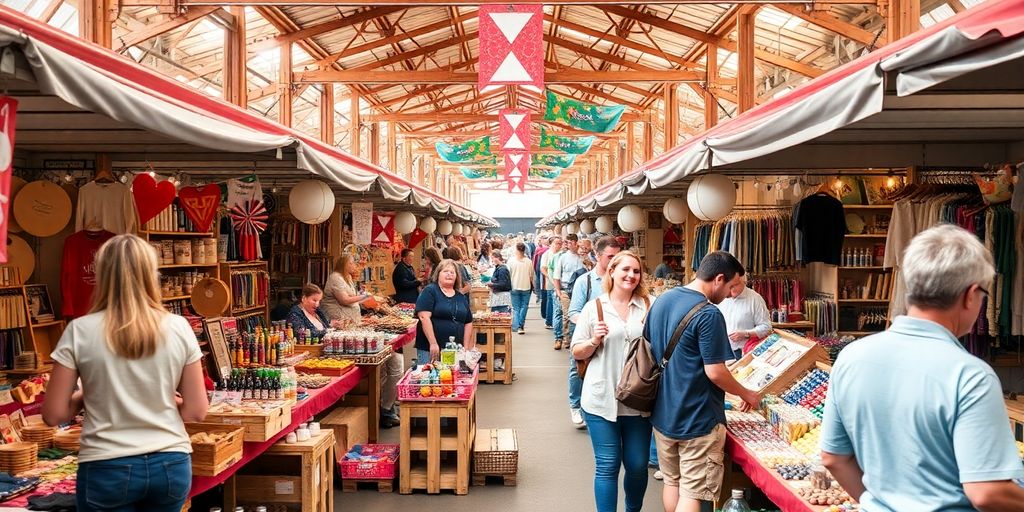
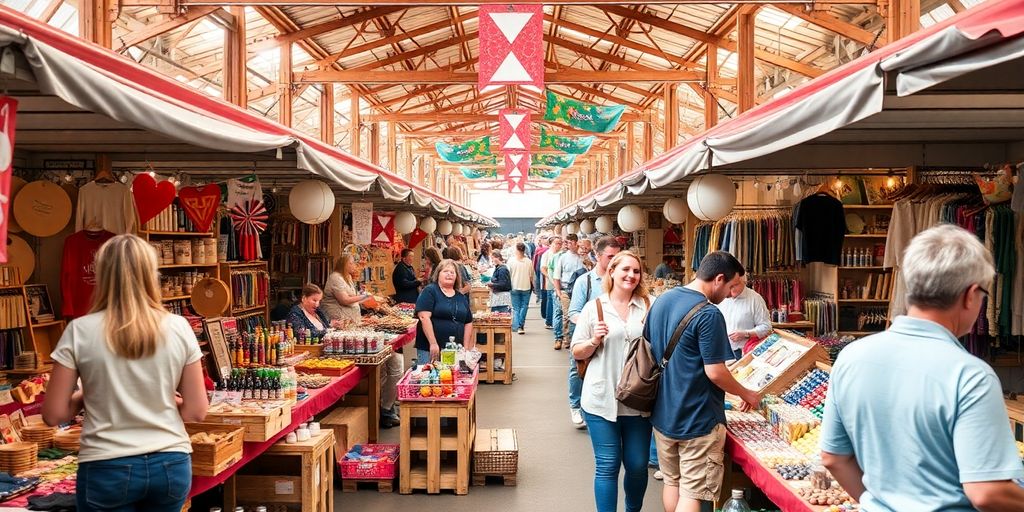

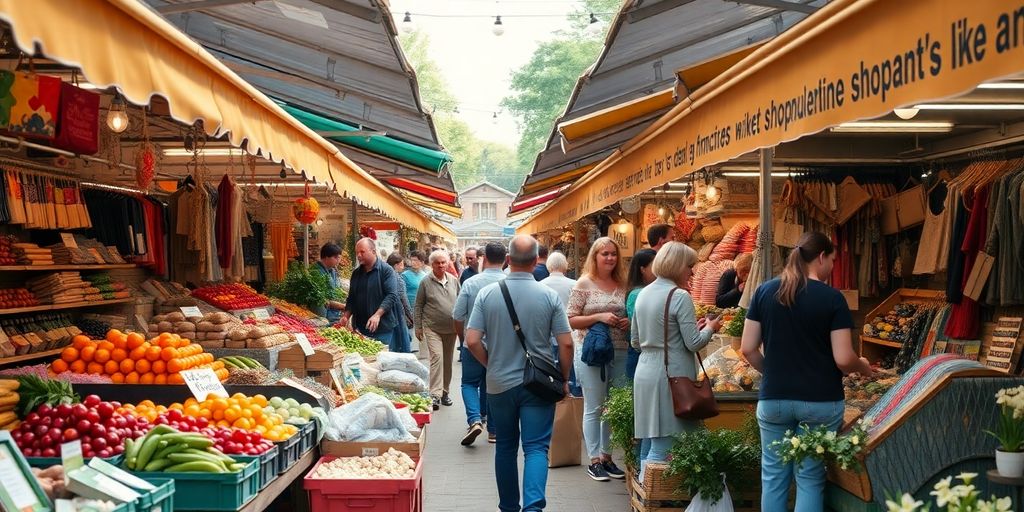
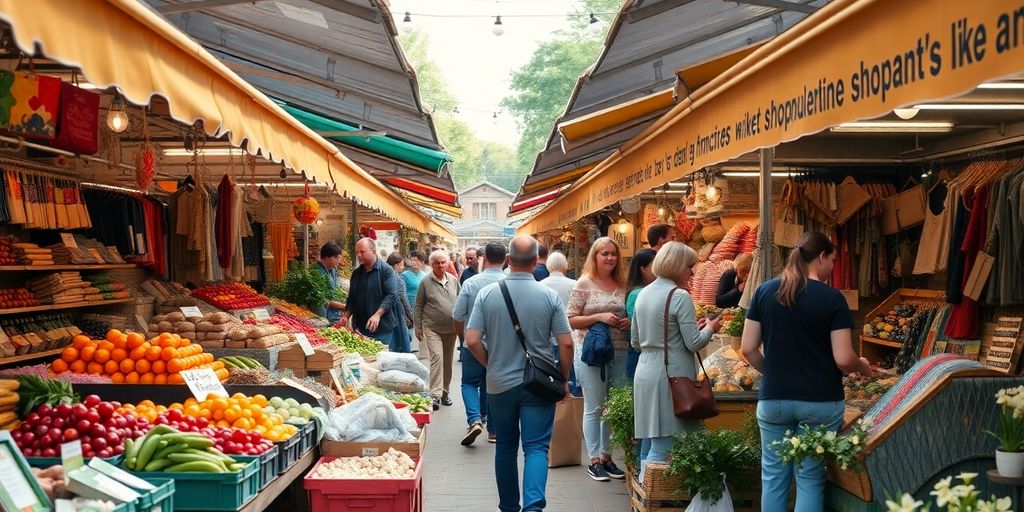
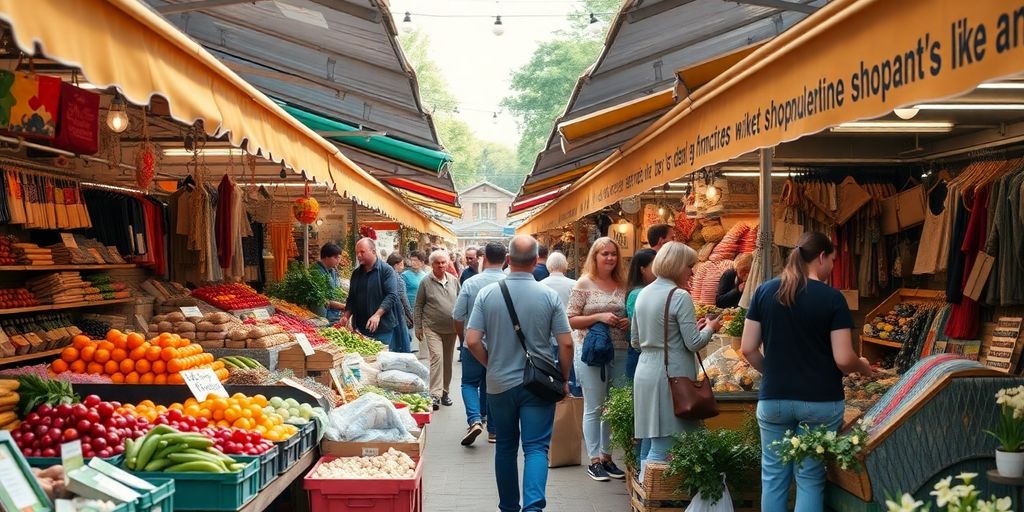
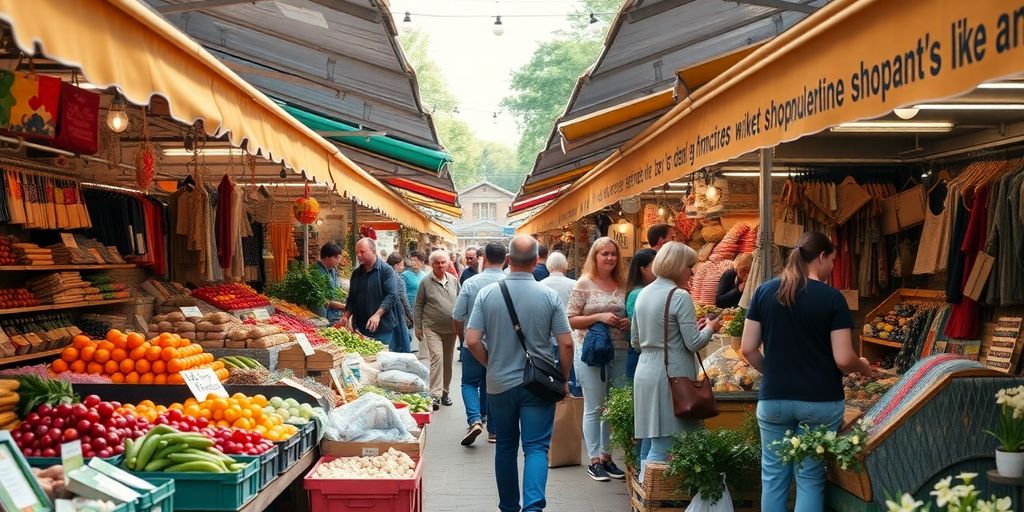

Responses